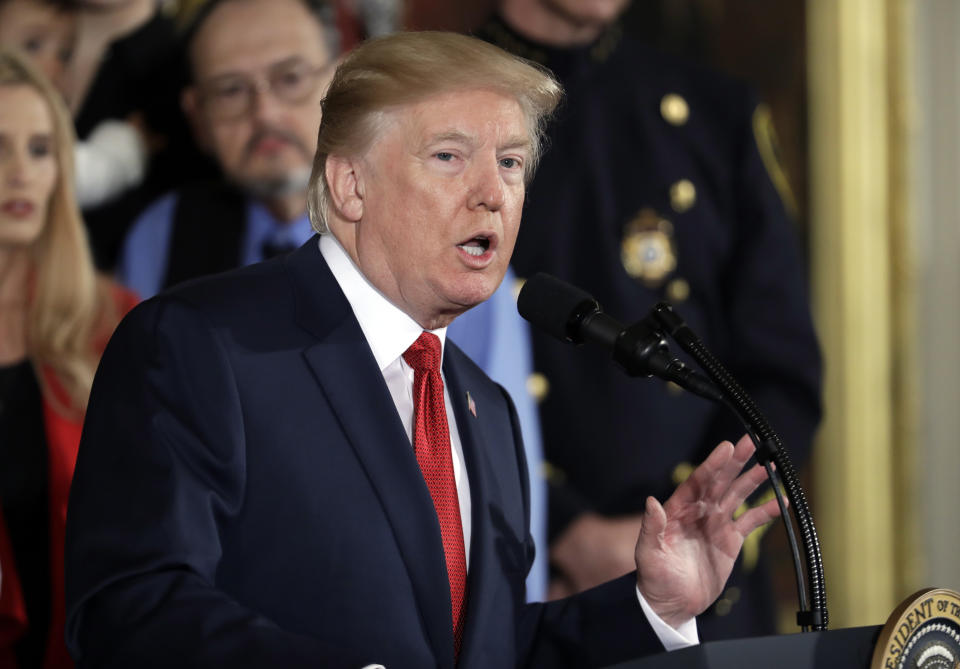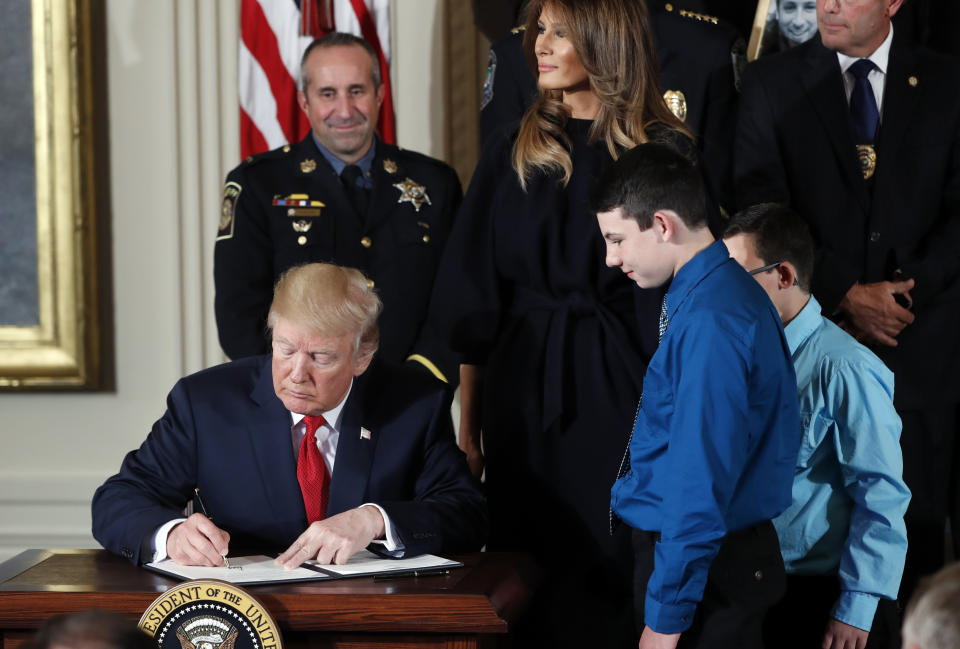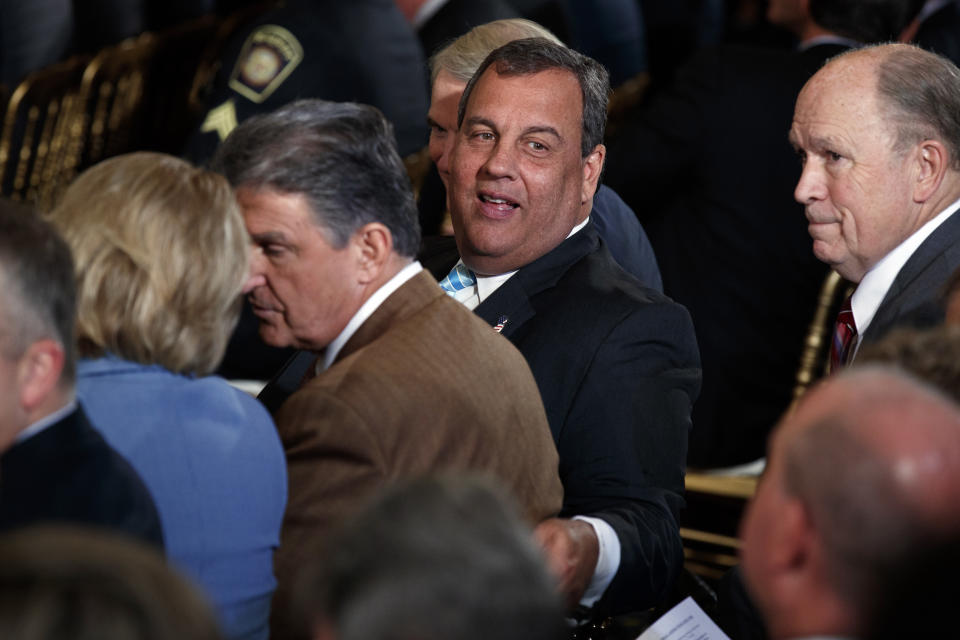Trump declares 'public health emergency' over opioid crisis: 'We can be the generation that ends the epidemic'
President Trump declared the opioid abuse epidemic a nationwide “public health emergency” Thursday afternoon.
“We can be the generation that ends the opioid epidemic. We can do it,” Trump said to applause at the White House. “That is why, effective today, my administration is officially declaring the opioid crisis a national public health emergency under federal law, and why I am directing federal agencies to use every appropriate emergency authority to fight the opioid crisis.”
Trump said his administration will confront the drug addiction crisis in the United States “head on” with “everything in our power.” He stopped short, however, of declaring a “national emergency,” which would have freed up additional resources.
“This epidemic is a national health emergency,” Trump said. “Nobody has seen anything like what’s going on now. As Americans we cannot allow this to continue. It’s time to liberate our communities from this scourge of drug addiction.”
A public health emergency is intended to mobilize resources to help the federal government respond to a public health crisis. Trump said confronting the epidemic will require efforts by federal and local government and the private sector, on numerous fronts including antidrug advertising, treatment for Americans with addictions, tough law enforcement on drug distributors and working with doctors and medical professionals on appropriate opioid prescribing.

Trump said the most important step in fighting the drug abuse epidemic is convincing the youth of the nation to never take drugs in the first place.
“There is nothing desirable about drugs — they’re bad,” he said.
Trump said his administration will work with the National Institutes of Health on a large-scale advertising campaign to promote that message, an echo of former first lady Nancy Reagan’s “Just Say No” campaign.
“They will see the devastation and ruination [drug addiction] causes to people and people’s lives. Watch what happens if we do our jobs, how the number of drug users and the addicted will start to tumble downward over a period of years. It will be a beautiful thing to see.”
Trump shared a personal story about his late older brother Fred Trump’s addiction to alcohol, which eventually killed him. Fred would regularly warn his younger brother not to drink or smoke, advice Trump says he took and for which he is grateful.
“And to this day I’ve never had a drink and I have no longing for it. I have no interest in it. To this day I’ve never had a cigarette,” Trump said. “He really helped me. I had someone who guided me.”

Trump said he hopes this “really tough, really big” advertising campaign will have the same affect on the youth of American that his brother had on him.
“If we can teach young people and people generally not to start it’s really, really easy not to take them. And I think that is going to be our most important thing,” Trump said.
Trump also said his immigration policies and proposed border wall along the U.S.-Mexico border will help stop criminal cartels from smuggling drugs into the country.
Trump said states that have requested relief should expect approvals to unlock treatment for people in need very quickly, “not like in the past” — in an apparent dig at former President Barack Obama.
New Jersey Gov. Chris Christie, who leads the White House Commission on Combating Drug Addiction and the Opioid Crisis, said in a statement Thursday, “I commend the President on the bold action he is taking today by adopting the first recommendation of his Commission on Combatting Drug Addiction and the Opioid Crisis to declare a national emergency.”
The commission’s final report is expected next week. Trump, who said he has already seen portions, plans to implement many of its proposals quickly.
“Some of the things they are recommending are common sense but very, very important, and they are going to have a tremendous impact,” Trump said.

According to the White House, declaring a public health emergency will expand access to telemedicine services, overcome bureaucratic delays and inefficiencies in the Department of Health and Human Services’ hiring process, authorize the Department of Labor to make payments to workers who lost their jobs owing to substance abuse and shift resources within HIV and AIDS programs to help people to receive substance abuse treatment.
Trump’s announcement comes a day after the U.S. Attorney’s Office for Massachusetts said John Kapoor, the founder of Arizona-based Insys Therapeutics Inc., was arrested and charged with bribing doctors to prescribe a powerful opioid.
According to the U.S. Department of Health and Human Services, the Secretary of the Department of Health and Human Services is allowed to determine that a public health emergency exists. The declaration lasts for 90 days but may be extended. Congress must be notified 48 hours before the declaration and relevant agencies must be informed, including the Department of Homeland Security, the Department of Justice and the Federal Bureau of Investigation.
Previous public health emergencies included the H1N1 flu (swine flu) outbreak in 2009 and SARS in 2003.
In August, Christie’s commission recommended that Trump declare a “national emergency” under the Public Health Service Act or the Stafford Act. This form of emergency is usually reserved for national disasters or terrorist attacks and would free up additional natural disaster assistance.
Shortly after, on Aug. 10, Trump called the opioid epidemic a “national emergency” during a media event at Trump National Golf Club in Bedminster, N.J. He had been asked if he thought the opioid crisis was an emergency and, if so, why he had not yet declared it.

“The opioid crisis is an emergency, and I’m saying officially right now: It is an emergency. It’s a national emergency,” Trump said at the time. “We’re going to spend a lot of time, a lot [of] effort and a lot of money on the opioid crisis.”
Without official paperwork, this extemporaneous reply was not enough to start redirecting resources toward the crisis.
The Trump administration’s actions on the opioid crisis so far have not been without controversy. An investigation by the Washington Post and “60 Minutes” into his nominee for “drug czar,” Rep. Tom Marino, R-Pa., led to Marino withdrawing his name from consideration. The investigation outlined Marino’s ties to the pharmaceutical industry and his leading role in passing a bill that critics claimed would seriously weaken the Drug Enforcement Administration’s ability to stop suspicious opioid shipments.
Sen. Orrin G. Hatch, R-Utah, who helped shepherd the law through the Senate in 2016, said he stands by the bill and accused the Post of painting “a misleading picture.”
Sen. Joe Manchin, D-W.Va., called for Trump to make the declaration in an appearance on “Fox & Friends” Wednesday morning. “It’s a national emergency. This is a disaster that we’re dealing with. It’s epidemic. Call it whatever you want to. It is hitting every part of my state of West Virginia. It is hitting every part of this great country of ours,” Manchin said. “We have to attack this full throttle, if you will. The president naming this a national emergency will give us the resources to go to the front line.”
According to the American Society of Medicine, 52,404 Americans died from drug overdoses in 2015 and opioid addiction is fueling this crisis: 20,101 deaths involved prescription pain relievers and 12,990 deaths involved heroin. The Centers for Disease Control reported that the number of opioid overdoses has quadrupled since 1999.
Read more from Yahoo News:
Opioid-law scandal sheds light on lobbying by industry-funded ‘patient access’ groups
Amid opioid epidemic, Vivitrol finds success marketing to judges and jailers
First responders face new risk amid opioid crisis: accidental overdose
‘Disgusting’: N.H. lawmakers demand apology for Trump’s ‘drug-infested den’ remark



